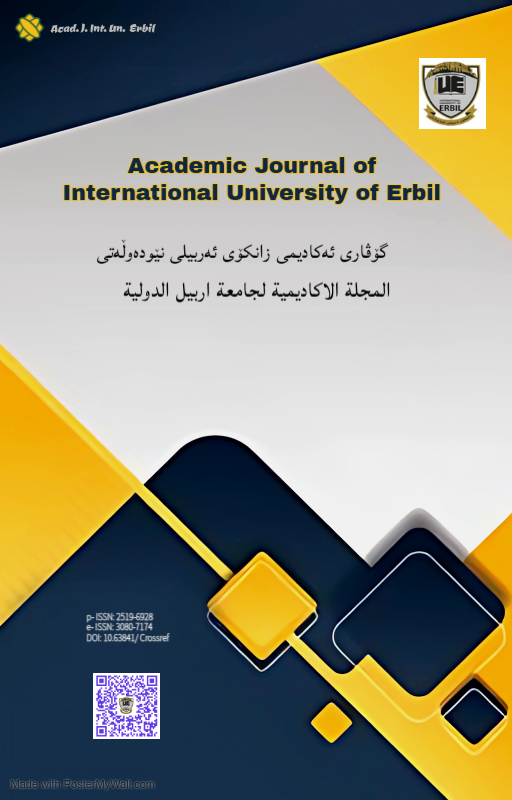The Effect of Organizational Culture on Employee Performance: A Case Study of public sector in Soran City
Effect of Organizational Culture on Employee Performance
DOI:
https://doi.org/10.63841/iue24571Keywords:
Organizational Culture, Employee Performance, Public Sector, Soran CityAbstract
Employee performance is a key factor in achieving organizational success in today’s rapidly changing and competitive environment. Organizational culture, as a set of shared values, beliefs, and practices, plays a vital role in shaping employee behavior and outcomes. This study aims to investigate the impact of organizational culture on employee performance in public sector institutions in Soran, Kurdistan Region, and to determine which aspects of organizational culture contribute most to improving employee performance, providing practical suggestions for improving workplace outcomes. The research problem stems from the limited understanding of how specific cultural elements influence employee productivity, satisfaction, and efficiency. The main objective of this study is to identify which aspects of organizational culture most significantly contribute to improved employee performance, providing practical recommendations for enhancing workplace outcomes. To achieve this, primary data were collected using a structured questionnaire composed of 113 items, distributed randomly to public sector employees. A total of 293 valid responses were analyzed. Data were processed and statistically analyzed using the SPSS software for descriptive analysis, Chi-square tests, and Probit regression. Furthermore, the SPSS programming language was employed to construct and prune a Decision Tree model, which visualized key determinants of performance. The Decision Tree helped identify cultural support for skills development, job satisfaction, and efficient task execution as top predictors of high performance. Probit regression confirmed that organizational culture, education, marital status, and income significantly influence performance levels. The findings revealed a strong correlation between a supportive organizational culture and high employee performance. Employees who perceived their organizational culture as inclusive, communicative, and development-oriented reported greater task efficiency, stronger job commitment, and overall job satisfaction. The Decision Tree model achieved an accuracy rate of 85%, with an F1-score of 0.83, confirming the reliability of the model in identifying performance drivers. In conclusion, this study underscores the importance of aligning organizational culture with employee needs to drive productivity and engagement. It provides a strategic roadmap for public sector organizations to enhance performance through cultural transformation and targeted interventions.
Downloads
References
P. R. Gamble, and D. A. Gibson, “Executive values and decision-making: The relationship of culture and information flows,” Journal of Management Studies, vol., 36, pp. 217-240,1999.
F. Shahzad, Z., Iqbal, and M. Gulzar, “Impact of organizational culture on employee’s job performance: An empirical study of software houses in Pakistan” Journal of business studies quarterly, vol.5, no.2, pp.56-64, 2013.
M. Zia-Ur-Rehman, “Organizations with Inclusive Leaders, Work Culture and Global Perspective: A Conceptual Analysis of Challenges and Prospects,” Russian law journal, vol.11, no.3, pp.3274-3281, 2023.
R. K. Rai, “Knowledge management and organizational culture: a theoretical integrative framework,” Journal of knowledge management, vol.15, no.5, pp.779-801, 2011.
S. Khan, S. Mishra, & S. A. Ansari, “Role of organizational culture in promoting employee development: a review of literature,” Linguistics and Culture Review, vol.5, no. S3, pp.585-595, 2021.
T. B. Tedla, “The impact of organizational culture on corporate performance,”, Walden Dissertations and Doctoral Studies. 2509, 2016. https://scholarworks.waldenu.edu/dissertations/2509/
S. Ahmed, “Organizational culture and employee’s performance in selected private secondary schools in Mogadishu Somalia,” Doctoral dissertation, Kampala International University, College of Humanities and Social Sciences, 2014.
R. Sivakami, and S. S. Samitha, “A study on the impact of organizational culture on employee performance,” International Journal of Management Research and Reviews, vol.8, no.7, pp.1-8, 2018.
S. A. Jiddah, S. M. B. Rayyan, and M. I. Umar, “Impact of organizational culture on employee performance in Nigeria,” International Journal of Novel Research in Marketing Management and Economics, vol.3, no.3, pp.48-65, 2016.
A. O. Paschal, and I. Nizam, “Effects of Organisational Culture on Employees Performance: Case of Singapore Telecommunication,” International Journal of Accounting & Business Management, vol.4, no.1, pp.19-26, 2016.
T. A. Etalong, and F. O. Chikeleze, “Effect of Organizational Culture on Employee Performance: A Survey of Selected Public Sector Organizations in Enugu,” European Journal of Business and Innovation Research, vol.11, no.7, pp.73-86, 2023.
R. T. Zebua, F. Hulu, N. A. Bu’ulolo, and A. B. Ndraha, “The Effect of Organizational Culture on Employee Performance,” Golden Ratio of Data in Summary, vol.4, no.2, pp.755-764. 2024.
Y. Tsai, “Relationship Between Organizational Culture, Leadership Behavior and Job Satisfaction,” BMC Health Services Research, vol. 11, pp.1-9, 2011.
A. Mulugeta, “The Effect of Organizational Culture on Employees Performance in Public Service Organization of Dire Dawa Administration,” Developing Country Studies, vol.10, no.5, pp.16-25, 2020.
N. Nazir, and S. Zamir, “Impact of Organizational Culture on employee’s performance,” Industrial Engineering Letters, vol.5, no.9, pp.31-37, 2015.
D. Iskamto, “Organizational Culture and Its Impact on Employee Performance,” International Journal of Management and Digital Business, vol.2, no.1, pp.47-55, 2023.
R. T. Zebua, F. Hulu, N. A. Bu’ulolo, and A. B. Ndraha, “The Effect of Organizational Culture on Employee Performance,” Golden Ratio of Data in Summary, vol.4, no.2, pp.755-764, 2024.

Downloads
Published
Issue
Section
License
Copyright (c) 2025 Academic Journal of International University of Erbil

This work is licensed under a Creative Commons Attribution-NonCommercial-NoDerivatives 4.0 International License.











